 |
A monthly publication of the United States Committee for a Free Lebanon |
 |
A monthly publication of the United States Committee for a Free Lebanon |
| Vol. 1 No. 3 | March 1999 |
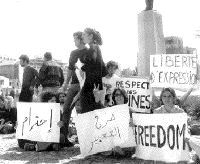 |
| A student sit-in at Riad el-Solh square, Beirut |
On March 15, Lebanese security forces stormed the campus of St. Joseph University to break up a demonstration of students protesting the Syrian occupation of Lebanon. Twenty-four students were arrested for distributing leaflets stating that the Syrian occupation "has brought nothing but devastation to our country and our people." Lebanese security officials said that the students were "interrogated for distributing leaflets that insult a brotherly country."
Most of those arrested were affiliated with either the Aounist Free National Current or the National Liberal Party. Most of the students were released within 24 hours. After their release, several students said that during their detention security officials threatened them and their family members and made them sign written statements promising not to be involved in "political activities."
The next day, March 16, a larger student demonstration took place on Huvelin street at St. Joseph University to protest the detention of five students who had not been released the previous day. Security forces ordered the university closed for the day and established checkpoints around the campus to prevent more students from taking part. The students organized a convoy of ten cars, adorned with Lebanese Flags and signs bearing the slogan "Liberty, Sovereignty, Independence," to deliver an open letter to U.N. Secretary General Kofi Annan at the U.N. building in Riad Solh square. Security forces, claiming the action was "inappropriate," intercepted the convoy and blocked the road with their vehicles. Several students who burst out of the cars and attempted to go on foot to the U.N. building were physically restrained by security forces.
By late afternoon, demonstrations had spread to other universities around Lebanon and four more students had been arrested. Two of the students, Raymond Haddad and Patrick Khoury, were taken to a military camp in Sin El Fil, Beirut. A third, Ziad Abs, was taken to the Interior Security Forces headquarters in Bourj. The whereabouts of the fourth, Charbel Malkoun, are unknown.
The human rights group Soutien aux Libanais D�tenus Arbitrairement (SOLIDA) reported in a March 16 press release the detention of a seventy year-old man, Boutros Noujeim, who was arrested on March 9 by Lebanese Army commandos and taken to the Ministry of Defense in Yarze.
On February 26, the U.S. State Department released its annual report on human rights conditions in Lebanon. The report highlighted serious and systemic violations of human rights in several core areas.
According to the report, "the arbitrary arrest and detention of persons who opposed government policies" continues to be a serious problem. Arrests are often made by Lebanese security forces without warrants and incommunicado detention of suspects without access to lawyers is frequent. The report also noted that torture is not banned by the Lebanese constitution and cited "credible reports" that security forces have employed torture to extract confessions during the interrogation of prisoners. Specific mention was given to the use of torture by military intelligence officials on former members of the Lebanese Forces. In addition, the report states that prison conditions in Lebanon "do not meet international standards" and "lack heat, adequate toilet and shower facilities, and proper medical care."
The report discusses the ubiquitous, intrusive surveillance of citizens by Lebanese and Syrian intelligence services, which "readily interfere with the privacy of persons regarded as foes of the government." Both intelligence services "use informer networks and monitor telephones to gather information on their adversaries."
"The government continued to restrict freedom of assembly," says the report. No public demonstrations are permitted without the explicit, written consent of the Lebanese interior ministry, which "does not render decisions consistently." However, the report does note (with a hint of sarcasm) that demonstrations protesting U.S. air strikes against Iraq and supporting Syria in its dispute with Turkey were permitted.
The report emphasizes that freedom of speech and freedom of the press are seriously curtailed in Lebanon. All books, plays, films, and foreign magazines are censored by the government before they are distributed in Lebanon. Moreover, Lebanese law explicitly prohibits the publication of any material which attacks "the dignity of the Head of State." Publication of information "deemed harmful" to the Syrian government is outlawed under a 1991 Lebanese-Syrian security agreement. These regulations have the effect of "intimidating journalists and broadcasters into practicing self-censorship."
The Lebanese judicial system is "subject to political pressure," according to the report. "Politicians and Syrian intelligence officers sometimes intervene to protect supporters from prosecution."
"The right of citizens to change their government remains restricted," according to the report, noting in particular that last year's election of Emile Lahoud as President "was influenced heavily by Syria." It also emphasizes that "strong Syrian influence over Lebanese politics and decision-makers makes Lebanese officials unwilling to press for a complete withdrawal" and that "the relationship with Syria does not reflect the will of most Lebanese citizens."
While providing detailed information on the above-mentioned human rights abuses, the State Department report neglects other important issues. Despite the availability of detailed documentation regarding the illegal detention of over 250 Lebanese citizens in Syria, the report states that the number of Lebanese in Syrian prisons is "uncertain. The report also states that "discrimination based on religion is built into the system of government," but does not elaborate. There is no mention, for instance, of the fact that members of the Christian opposition are virtually absent from parliament because the electoral district of Mount Lebanon had been split up and gerrymandered in violation of the 1990 Ta'if Accord.
On March 6, in an interview broadcast on the BBC's Arabic service, Lebanese Prime Minister Selim al-Hoss said that in the event of an Israeli withdrawal, Lebanon would abide by the 1949 Israel-Lebanon armistice agreement and prevent cross-border attacks. "An Israeli withdrawal would revive the armistice agreement," said al-Hoss, "and according to the armistice agreement there can be no action, no military actions across the border." When the BBC reporter asked whether he could guarantee there would be no military action against Israel, Hoss said that "the armistice agreement would dictate that explicitly."
Israeli Prime Minister Benjamin Netanyahu said in a statement issued shortly thereafter that Israel will withdraw once there are "security arrangements that we can rely on." He added, "if Lebanon proves that its intentions, as stated by Hoss, are serious, we will be able to move forward with such necessary arrangements."
Unfortunately, al-Hoss had neglected to clear his statement in advance with Syrian officials. Later in the day, he claimed that his remarks had been "misinterpreted." In a statement to the Lebanese National News Agency, al-Hoss said "our position is firm and will not change. Lebanon is not ready to discuss any security arrangements or guarantees for an Israeli pullout."
Last spring, Israel dropped its previous conditions for a withdrawal from south Lebanon and announced that it was prepared to do so once the Lebanese government agrees to maintain security in the south and stop anti-Israeli paramilitary groups from launching raids into northern Israel.
Lebanese officials have persistently refused to provide such security guarantees. Al-Hoss's predecessor, Rafiq al-Hariri, was fond of saying "only God can provide security" when asked if the Lebanese army would reign in Hizbollah once the Israelis departed.
According to most observers, Syria refuses to allow Lebanese officials to give explicit security guarantees in order to generate uncertainty in Tel Aviv as to whether attacks will continue once Israeli forces withdraw.
This uncertainty is heightened by Hizbollah's categorical refusal to state whether or not it will launch raids into Israel after the departure of Israeli forces from the security zone. "This is a question we don't answer. We have to see what shape, what kind of withdrawal takes place. Then maybe we will give an answer," said Hizbollah spokesman Ibrahim Mousawi at a recent press conference.
Reports that Israeli defense planners are considering a far more aggressive policy in Lebanon that would include striking Syrian targets in retaliation for attacks by Hizbollah sent shock waves through Damascus earlier this month.
Knesset Foreign Affairs and Defense Committee chairman Uzi Landau is pressing officials in the Israeli government to adopt what he calls the "Turkish logic" in dealing with Syria's support for paramilitary attacks against Israeli troops in south Lebanon. Last October, Turkey began mobilizing troops and threatened a large-scale invasion of Syria unless Damascus ended its support for PKK insurgents. The Syrians complied, expelling PKK leader Abdullah Ocalan from Syria and closing PKK facilities.
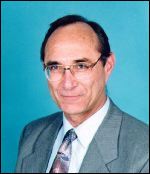 |
| Dr. Uzi Landau |
"Our response [to Syrian-sponsored violence] should be ongoing and lengthy. We need to hit the roads, bridges, water carriers, and put a siege on ports from time to time; damage the Lebanese power stations and military facilities, and if that is not effective - we should reach Syria," said Landau. "Lebanon and Syria need to be made aware there is no such thing as a luxury war."
Landau's proposal struck a positive cord among many Israeli commentators. "Syria must be told categorically that it is risking war with Israel," wrote Ze'ev Schiff in the March 8 issue of Ha'aretz, "because no one can expect any responsible country to stand by and let its civilian population be shelled while continuing a 'business as usual' attitude toward those providing the technical assistance facilitating the shelling."
While Israeli Defense Minister Moshe Arens did not explicitly endorse Landau's proposal, he did suggest that Israel scrap the 1996 April Understanding which limits the scope of Israeli retaliations for Hizbollah attacks.
Judging from reactions in the official Syrian government newspaper, Tishrin, Syrian President Hafez al-Assad concluded that an extensive Israeli military operation against Syrian forces in Lebanon was being planned.
Al-Assad immediately dispatched a delegation of high-ranking Syrian military officers to Lebanon on March 6 to discuss contingency plans for an armed conflict with Israel. The delegation included General Ibrahim Safi, the commander of Syrian troops in Lebanon, Major General Ghazi Kenaan, the head of Syrian military intelligence in Lebanon, and Colonel Rustom Ghazali, the head of Syrian military intelligence in Beirut. The delegation held lengthy discussions with the top echelon of Lebanese security officials including Interior Minister Michel Murr, Defense Minister Ghazi Zeaiter, Army Commander General Michel Suleiman, Commander of the Internal security Forces Major General Abdel-Karim Ibrahim and the chief of army military intelligence, Colonel Raymond Azar.
Two days later, Syrian Defense Minister Mustafa Tlas and Military Chief of Staff General Ali Aslan visited Lebanon. Both, it seems, spent a great deal of time giving pep talks to Syrian and Lebanese military units. Upon his arrival, Tlas highlighted the unprecedented level of operational coordination that now exists between the Lebanese army and Syrian forces stationed in Lebanon. "We are ready and prepared to confront Israel through the cooperation of both armies and the two brotherly states," said Tlas to a unit of Syrian soldiers. He urged them repeatedly to "to remain on the alert, in view of Israel's aggressive intentions."
On March 9, Syrian military Chief of Staff General Ali Aslan told the army magazine Al Jeysh that the Lebanese army has become, in essence, an arm of the Syrian military. "This could not have been achieved without the vast experience of [Lebanese President Emile] Lahoud," Aslan said, "who headed this army for nine years, during which it was turned into a strong Arab army which faced Israel in south Lebanon." The Syrian general praised the Lebanese army for assisting Hizbollah and providing them with a "military umbrella so as to enable them to continue their actions, which cause the enemy to lose sleep."
Despite the fiscal reforms promised by the new Lebanese government of President Emile Lahoud and Selim al-Hoss, Lebanon's macroeconomic outlook is still considered by many to be dismal. The country's 1999 economic growth rate is forecast to remain at no more than 3%. Its deficit is expected to be around 40-50% of spending next year--meaning that debt servicing is set to rise another $464 million.
As a result, the Beirut Stock Exchange (BSE) is now hitting record lows. The number of shares traded fell 30% in 1998 and their value plunged 48%. Market capitalization declined about 10%. The trend has continued in 1999. In January, the value of trade fell to $10.7 million (from $29.6 million one year ago) and in February fell 79% to $8.2 million.
"Lebanon has a pathetic growth rate, political instability, economic instability stemming from a large budget deficit and not much is being done to address corruption," said Ziad Maalouf, vice president of the Middle East Capital Group. "If the macroeconomic picture is not solid then the stock market will not take-off. And the picture in Lebanon is not solid," he said.
"The state of the public finances will in the end determine investor confidence in Lebanon," said Tarek Gargour, Middle East and North Africa analyst for London-based HSBC Securities. "Until we see inroads being made in the deficit and other economic aspects then even local investors will be discouraged. We're waiting to see how the macro picture will pan out."
A recent report issued by Merrill Lynch said that a decline in confidence levels in the banking system and government could further jeopardize Lebanon's macroeconomic stability. In the past, declines in confidence in the Lebanese banking system have been reflected in shrinking deposits, which has hampered the ability of Lebanese banks to roll over mature government debt. A further slump in the confidence of the Lebanese government could result in an even greater shift from domestic currency-dominated deposits to foreign currency deposits.
The report said that the Lebanese government should have a clear commitment to boost tax revenues and counter asset sales. The confidence level in the future will be primarily a function of how quickly the government is able to adopt fiscal reforms. It pointed out that the high interest rate of the local currency government debt generates the risk of a macroeconomic "hard landing" or devaluation. Even in the event of a soft landing, quality of loans in 1999 are expected to suffer due to the recessionary impact of deficit reduction achieved last year.
On February 10, spokesmen for Afghanistan's ruling Taliban announced that exiled Saudi dissident Osama bin Laden had "disappeared" from Afghanistan. Bin Laden, who is wanted by U.S. authorities in connection with the August 7 bombings that destroyed U.S. embassies in Kenya and Tanzania, had been living under heavy guard in Kandahar, a city in southern Afghanistan.
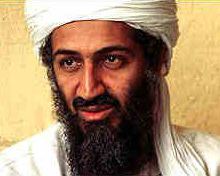 |
| Osama bin Laden |
The announcement came amid reports of a clash in Kandahar between bin Laden's bodyguards and a group of Taliban agents who were monitoring his movements. Following the fight, bin Laden was expelled from the city.
The cloak of secrecy surrounding Bin Laden's whereabouts is a dangerous new development. Bin Laden has demonstrated a remarkable capability of planning and coordinating attacks even when his exact whereabouts were known.
According to senior U.S. intelligence officials, there have been at least seven attempts by Bin Laden's Al Qaeda terrorist network to bomb U.S. facilities overseas since the embassy bombings in Kenya and Tanzania last August. The planned attacks targeted Prince Sultan Air Base in Saudi Arabia, where more than 50 U.S. jets are kept, and U.S. embassies in Albania, Azerbaijan, Ivory Coast, Tajikistan, Uganda and Uruguay.
The six embassy attacks were prevented by U.S. intelligence agents, who used sophisticated satellite reconnaissance technology to monitor bin Laden's telephone calls and tipped off local officials, who arrested the terrorists suspected of preparing to carry out the attacks.
Given the difficulty of preempting future attacks without explicit knowledge of Bin Laden's whereabouts, finding him has become a top priority for the U.S. intelligence services.
Reports of Bin Laden's Whereabouts
Despite claims by the Taliban that Bin Laden has left territory under its control, U.S. officials say that he has most likely relocated elsewhere in Afghanistan. "Our experts and other informed observers believe he remains in Taliban-controlled territory," said assistant secretary of state for South Asian affairs Karl Inderfurth at a congressional hearing on March 9. "The Taliban are playing a risky and unwise game in attempting to convince us otherwise."
MEIB has received unconfirmed reports that U.S. intelligence agents were initially able to track bin Laden's movements after his "disappearance" by monitoring the use of his satellite phone. According to these reports, Bin Laden first went to Tora Bora, Afghanistan, then moved to the Helmand region. He was then tracked to the Jalalabad region, which is controlled by former Prime Minister Gulbuddin Hekmatayar.
Many in the intelligence community believe that bin Laden has probably sought refuge in a network of fortified caves in the Jalalabad region. These caves were constructed by Afghan resistance fighters and CIA operatives during the struggle against Soviet occupation in the 1980's and are designed to withstand heavy aerial bombardment.
However, there are reports that bin Laden may have left the country. Saddam Hussein recently offered political asylum to the fugitive terrorist, fueling speculation that he has gone to Iraq. Other possible destinations believed to be hospitable to bin Laden are Chechnya and Yemen.
A series of revelations by sources in the U.S. government have brought to light a much higher level of CIA involvement in UNSCOM's arms inspection program than previously thought.
The Washington Post published a lengthy report on March 2, citing officials who spoke on condition of anonymity, which stated that "the United States rigged UNSCOM equipment and office space -- without permission -- to intercept a high volume of ordinary Iraqi military communications."1
Communications between Iraqi army units takes place over a network of "line-of-site" microwave channels which typically transmit signals from hilltop to hilltop and are therefore difficult to intercept by aircraft or satellites. U.S. intelligence operatives were reportedly allowed to install eavesdropping equipment capable of intercepting these microwave transmissions into UNSCOM's "remote monitoring system," which relays images from various remote sites throughout Iraq to UNSCOM's headquarters.
The information leaked to the Washington Post came amid startling revelations by former United Nations arms inspector Scott Ritter that UN inspection teams in Iraq have included "CIA paramilitary covert operatives."
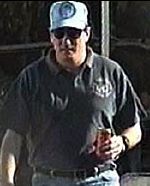 |
| Scott Ritter |
In his upcoming book, Endgame, Ritter provides a detailed description of his work for the United Nations, beginning in 1991 and ending last summer when he resigned and accused the Clinton administration of interfering in the arms inspection program. Ritter claims that the CIA began placing American spies among UN weapons inspectors in Iraq about a year after the end of the 1991 Gulf War.
Ritter writes that in June 1996, nine CIA operatives were placed on a team inspecting compounds maintained by the elite Iraqi Republican Guards. That same month, Iraqi dissidents made a failed coup attempt against Saddam. Ritter said he later became suspicious of the timing of the coup attempt. "The inspection was directed almost exclusively at Special Republican Guard sites; the coup plotters were from some of the same units we were trying to inspect."
"The most important sites bombed during Operation Desert Fox were derived from data obtained from the work conducted by my team," claims Ritter. In an interview with the Israeli daily newspaper Ma'ariv earlier this month, Ritter admitted that he gave the U.S. officials the address of Saddam Hussein's mistress for use in an attempt to assassinate the Iraqi leader. "The information about where Saddam Hussein's mistress lived came from me," he said. US forces reportedly fired a cruise missile at the residence during the Desert Fox campaign against Iraq in mid-December, but Saddam was apparently not there at the time.
While declining to comment directly on these allegations, White House spokesman David Leavy said recently that "everything that the United States did was to support UNSCOM in its effort to break Iraq's concealment of its weapons of mass destruction . . . no intelligence that was gathered to support UNSCOM was used for Iraqi regime-change activities." Leavy did not comment directly on reports that U.S. agents used UNSCOM equipment and offices to intercept Iraqi military communications.
The Defense Department, which demanded that Ritter turn over a copy of the book for a security review before publication, would not comment on whether it was considering legal action to block distribution. Ritter, a former Marine intelligence officer, was paid by the Defense Department and was considered to be on loan while working for the United Nations. The Pentagon has argued that under his contract, Ritter is required to submit the book for a security review if it contains any information, classified or unclassified, about his work for the United Nations. "We have reminded Ritter of his responsibilities, and we just leave it at that," said David Rigby, a spokesman for the Defense Threat Reduction Agency. Ritter and his lawyer have argued that the Pentagon's demand is an effort to intimidate him into silence and that the contract cannot be enforced since it expired last year.
1
Barton Gellman, "U.S. Spied On Iraqi Military Via U.N.", Washington Post, 2 March 1999, p. A01.On October 20, 1998, under threat of a Turkish invasion, Syria signed an agreement officially designating the Kurdistan Workers Party (PKK) as a terrorist organization and pledging not to allow the presence or activities of the PKK on Syrian or Lebanese soil.
According to Turkish intelligence sources, however, Syria is not abiding by the stipulations of this agreement. PKK financial resources and other assets in Syria have reportedly been reorganized under the banner of a new organization, the Democratic Union of the Homeland (DVB). The only difference seems to be that the DVB is somewhat more subservient to the Syrian intelligence service (mukhabarat) than the PKK.
Turkish officials have recently had other reasons to believe that Syria and occupied Lebanon are not exactly a "PKK-free zone." Several well-organized, high-profile demonstrations in support of imprisoned PKK leader Abdullah Ocalan have taken place in Beirut in recent weeks, often drawing hundreds of protesters. "The Lebanese told us that there was no PKK, but now my mind has changed," said Turkish ambassador to Lebanon Nazim Dumlu after witnessing one such demonstration on March 3. "There are increasing activities for the PKK in Lebanon, through their flags, their banners," he added.1
Turkish officials were apparently unconvinced by the Lebanese government's claim that Lebanon is a "democratic" country which permits peaceful demonstrations by its citizens, and proposed that a joint committee be established to investigate the presence of PKK agents in Lebanon. Not surprisingly, Lebanese officials flatly rejected the proposal.
1 Milliyet, 27 February.
Syrian autocracy is in transition. Army officers who rose to positions of power in the regime of Syrian President Hafez al-Assad over the last three decades are suddenly being being dismissed in favor of others. The top echelon of Ba'ath party officials is being reshuffled. The concentration of Alawites at the highest levels of the regime is greater than ever before. These shifts in the power structure of the regime have been apparently been orchestrated by the Syrian President in order to pave the way for the smooth succession of his 34-year-old son Bashar.
Briefing: Medical Condition of
Hafez Assad |
Until the 1994 death of Basil, Hafez al-Assad's eldest son and heir apparent to the dictatorship of Syria, Bashar had little interest or experience in governing Syria, having pursued an interest in medicine, not politics, for most of his adult life. All of that changed in 1994, however, when the Syrian dictator ended Bashar's medical studies three months before his graduation and began molding him in his own image. After graduating from the Military Academy in 1994 as a captain, Bashar was promoted to the rank of major in the Presidential Guards within two months. Bashar, recently elevated to the rank of lieutenant colonel, is widely expected to be appointed to the Baath party's Regional Command during the party's next Congress. The next step will be his appointment as Syria's vice president.
However, realizing that newcomers like Bashar do not often fare well in the dark, conspiratorial world of intragovernmental Syrian politics, Hafez al-Assad is making sure that no serious challengers to Bashar's authority will be anywhere near the top of the regime pyramid once his son takes over.
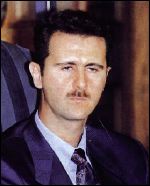 |
| Bashar Assad |
Last year, President al-Assad officially stripped his brother Rifaat of the Syrian vice presidency, removing the most likely opponent of Bashar's succession. In July, he sacked General Hikmat Shehabi, who had been the armed forces chief of staff for 24 years--reportedly because he did not get along well with Bashar. Shehabi was replaced by General Ali Aslan, a close associate of Bashar who is best known for having commanded the Syrian 5th Division which drove Israeli forces from the southern and central plateau of the Golan Heights during the 1973 Yom Kippur War. Major General Bashir Najjar, the head of civilian intelligence, was also fired in July and replaced by Major General Mahmoud Al-Saqqa, who commanded the Syrian contingent that took part in the 1991 Gulf War. Another officer close to Bashar who occupies a position of power in the regime is his uncle on his mother's side, General Adnan Makhlouf, who is the security affairs advisor to President al-Assad and the commander of the Republican Guard, which consists of 30,000 well trained and equipped soldiers.
Intelligence sources say that a new generation of generals is expected to take command of other important intelligence and security organizations. General Assef Shahine is poised to replace General Ali Douba as head of military intelligence while General Hicham Bakhtiar, chief of the Palestine section of the National Security agency (Al Amn al Qawmi), will probably be elevated to a more important position. General Ali Houegi, deputy head of Air Force intelligence, is on track to succeed his immediate superior, General Mohammad al Khouly. Bashar's brother in law, Major General Assef Shawkat, is expected to be appointed commander of the Damascus barracks or another top position in the general staff because of his close association with General Aslan.
Other military officers expected to play a role in Bashar's regime include his younger brother, Colonel Maher al-Assad, who is preparing to take up a leading post within the Republican Guard. General Bahjat Suleiman, a member of the Baath party Regional Command who is said to be Bashar's political "godfather," has reportedly been sounded out for a leading position in the National Security Agency (NSA). The internal security department of the NSA is already headed by an official close to Bashar, General Mohamed Nassif. He is reportedly in charge of such delicate files as the regime's relations with the Moslem Brotherhood. General Iyad al-Mahmoud, the architect of the strategic Syrian-Iranian alliance, is likely to be Bashar's advisor for Iranian affairs.
Bashar's role in government affairs has increased greatly over the last few years. He and his staff have been given the entire first floor of the presidential palace in Damascus (his father's offices are on the second). Recently, he has devoted himself to combating corruption. "If he fails to crack down [on corruption]," says one source, "he won't be able to impose his authority on governing circles who have filled their pockets in recent years."
Meanwhile, a propaganda campaign has been underway to prepare the people of Syria for Bashar's overlordship. Syrian TV and radio often broadcast songs praising Bashar, and his picture now appears alongside his father's on posters plastered throughout Syria. The Mufti of Damascus has devoted several recent sermons to praising Bashar.
Interestingly, it is said that Hafez al-Assad anticipates that the strongest potential challenge to Bashar's authority will emanate not from within Syria itself, but from Syrian-occupied Lebanon. Bashar regularly holds meetings with the same network of pro-Syrian Lebanese political bosses and ex-militia leaders who were instrumental in helping Syria suppress of General Michel Aoun's 1989-1990 "war of liberation."
Despite all of the precautions taken by his father, Bashar's political future is still questioned by many analysts. "I doubt that Bashir has it in him to survive," says Ron Tira, a former Israeli army intelligence officer specializing in Syria. "He is not like Saddam Hussein's son Uday, who can kill people before breakfast." It took Hafez al-Assad over a decade of bloody repression, in which tens of thousands of people were butchered, before the Syrian people were subdued into accepting his rule. Whether his son will have the stomach to eliminate all resistance to his authority remains to be seen.
Syria has reportedly agreed to supply surplus military equipment to Iraq, according to intelligence sources. According to an an agreement recently signed between the two countries, Syria will send Iraq about �60 million worth of spare parts, including engines and tracks for Soviet-built tanks and armored fighting vehicles. An agreement for the supply of spare parts for anti-aircraft radars, damaged by recent American and British bombing attacks, and components for lorries, aircraft, helicopters, and ammunition is reportedly being negotiated.
Since the 1991 Gulf War, the Iraqi military has faced a severe shortage of spare parts due to economic sanctions imposed by the U.N. Security Council. Intelligence sources say that the new agreement has the potential of reactivating a sizable portion of Iraq's once-formidable arsenal of conventional military armaments that have become inoperative over the last eight years.
Iraqi-Syrian relations have improved considerably over the last few years, culminating in recent agreements stipulating political and economic cooperation.
MEIB analysts have been closely monitoring anti-regime activity in Iraq over the last few months and have compiled their findings in the following detailed report. Much of the information in this report is not available through the mainstream American media. Footnotes have been added for information obtained directly from Iraqi opposition groups and other intelligence sources which could not be independently verified by the time this issue of MEIB hit the press.
In January, Iraqi president Saddam Hussein reportedly uncovered what analysts have called the most serious coup attempt since the 1991 Persian Gulf War. The coup attempt was led by a number of exiled army commanders, including a former chief of staff, who initiated a series of contacts with several high-ranking officers in command of army divisions stationed around Baghdad. The plan was for these divisions to seize control of key government installations during a future military escalation between Iraqi and American forces.
Two generals in the Iraqi army who were contacted by the dissidents apparently informed Saddam Hussein of the plan, however, and Iraqi intelligence quickly uncovered those who were participating in the plot. In mid-January, three senior officers in Republican Guard--Colonel Dhiaa Najm al-Deen, Lieutenant Colonel Asaad Mahmood and Lieutenant Ali Abd al-Ilah al-Takriti--were executed in front of an assembly of fellow officers.1
On February 8, another 24 army officers were executed for allegedly taking part in the plot, including Lt. Gen. Kamel Sachet, who had commanded an Iraqi division during the 1991 Gulf War, and Maj. Gen. Ghadhban Abed al-Ghriri, who was previously in charge of anti-aircraft installations in Baghdad. In response to Al-Ghriri's execution, members of his clan reportedly began rioting, resulting in the death of a police officer and twenty arrests.2
1 Press release by the London-based Supreme Council for
Islamic Revolution in Iraq, 1 February 1999.
2 Press release by the London-based Supreme Council for Islamic Revolution in
Iraq, 9 March 1999
Iraqi Shiites Take to the Streets
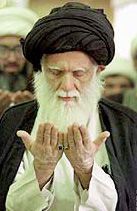 |
| Ayatollah Mohammad Sadek al-Sadr |
On February 19, Iraqi government agents assassinated Ayatollah Mohammad Sadek al-Sadr, Iraq's highest-ranking Shi'ite religious leader, and two of his sons. Al-Sadr, whose Friday prayers at the historic Masjid Al-Kufa often drew up to 100,000 people, had acquired a significant mass following among Iraqi Shiites. Cassette tapes of his sermons, in which he dared to criticize the government for outlawing Shi'ite rituals and demanded the release of Shi'ite political prisoners, are widely available in the streets of southern Iraq.
His death set in motion the greatest Shi'ite challenge to government authority since 1991. Despite the Iraqi government's denial of complicity in the assassination (which belatedly occurred two days after his death), demonstrations spontaneously erupted in the southern Iraqi town of Nassiriya, to which the Iraqi government responded with deadly force, killing 20 people and wounding dozens.
Shi'ite religious leaders appear to have become increasingly polarized against the regime, seeing al-Sadr's death as the manifestation of a systematic effort to silence the clergy (Al-Sadr is the third Shi'ite cleric killed in the last year). In response, the Iraqi government has arrested 120 Shi'ite clerics from various central and southern Iraqi cities over the last month, including 27 seminarians from the holy city of Najaf al-Sharif. 1 Two members of al-Sadr's staff, Akeel al-Mussawi and Sheikh Ahmed al-Shamki, were among those detained.
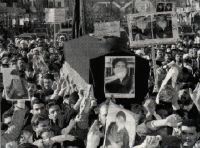 |
| A Shi'ite demonstration protesting Al-Sadr's assassination |
Reports of armed attacks against the government by Shi'ite opposition groups have begun to trickle out of Iraq. On February 27, SCIRI opposition forces claimed to have launched a series of attacks on four buildings belonging to the Iraqi intelligence services and ruling Baath party in the town of Kerbala, 100 kilometers south of Baghdad, in retaliation for Sadr's assassination.2
There had also been several violent incidents of opposition to the regime by Iraqi Shiites in the month prior to Al-Sadr's assassination. On January 15, Iraqi security forces opened fire on a gathering of protesters demanding the release of Sheikh Awas, Imam of the Nasiriya city mosque. Five people were killed, eleven wounded and two hundred arrested. During the first week of February, Iraqi authorities executed 27 members of an organization called the "Fidayi Saddam" in the Governorate of Amara and delivered their bodies to their families. The men were reportedly accused of plotting the assassination of Ali Hasan Al Majid. the Iraqi military commander in charge of southern Iraq.
1 Al-Sharq al-Awsat, 26 February 1999
2 Al-Ittihad, 3 March 1999
In October 1998, Congress passed the Iraq Liberation Act, allocating $97 million "to support efforts to remove the regime headed by Saddam Hussein from power in Iraq and to promote the emergence of a democratic government to replace that regime." On January 19, the Clinton administration designated seven Iraqi opposition groups eligible to receive these funds. For the benefit of readers who are unfamiliar with Iraqi politics, MEIB analysts have compiled the following profiles of these seven opposition groups.
Iraqi National Congress (INC)
Based in London
Headed by Ahmad Chalabi. Established shortly after the 1991 Gulf War. Launched a sporadic
guerrilla war against Iraqi government forces in northern Iraq with CIA assistance. Most
of its guerrilla forces were eliminated when Iraqi Republican Guards stormed their
positions in the Kurdish region on August 31, 1996. The INC has indicated it will accept
funds allocated by the Iraq Liberation Act.
Iraqi National Accord (INA)
Based in Amman and London
Headed by Ayad Allawi, a former associate of Saddam Hussein who defected in the 1970's.
Most other members of the INA are former government officials who left Iraq after the Gulf
War. It has had close associations with the CIA in the past. Maintains a radio station and
other media outlets. The INA has indicated it will accept funds allocated by the Iraq
Liberation Act.
Kurdistan Democratic Party (KDP)
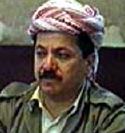 |
| Massoud Barzani |
Based in Northern Iraq
Established in 1947 by Mustafa Barzani (and led by his son Massoud since 1979) to fight
for autonomous rule in the Kurdish region of Iraq. Controls roughly two thirds of the
Kurdish enclave in northern Iraq. The KDP has indicated it will decline funds allocated by
the Iraq Liberation Act.
Islamic Movement of Iraqi Kurdistan (IMIK)
Based in Northern Iraq
A small group established shortly after the Gulf War.
Patriotic Union of Kurdistan (PUK)
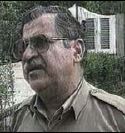 |
| Jalal Talabani |
Based in Northern Iraq
Established by Jalal Talabani in 1975 after he and other leftists split from the KDP. The
group controls nearly one-third of the Kurdish enclave in northern Iraq. The PUK has
indicated it will decline funds allocated by the Iraq Liberation Act.
Supreme Council of the Islamic Revolution in Iraq (SCIRI)
Based in Teheran
Headed by Mohammad Baqir al-Hakim
An umbrella organization established in 1982. Comprised of several Shi'ite groups seeking
to topple Saddam Hussein's regime for. Although it receives considerable support from Iran
and has advocated a strictly Islamic government in the past , Al-Hakim has recently said
that SCIRI is committed to supporting a democratic government representing Iraq's diverse
ethnic and religious groups. The group has a military wing operating out of southern Iraq.
The SCIRI has indicated it will decline funds allocated by the Iraq Liberation Act.
Constitutional Monarchist Movement
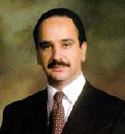 |
| Sharif Ali bin Al-Hussein |
A group centered around Iraq's closet surviving heir to the Hashemite throne of Iraq, Sharif Ali bin Al-Hussein. Sharif is a cousin of the late King Faisal II who was overthrown and killed in a 1958 army coup. He has promised to establish a democratic government and assume the throne if chosen to be king in a national referendum. The Constitutional Monarchists are believed to have little support among the Iraqi population and no paramilitary forces at their disposal, but are also recognized as being "above the fray" of ethnic and religious infighting.
The debate in Washington over how best to secure the removal of Iraqi dictator Saddam Hussein has become extremely acrimonious in recent months. The range of options being considered are outlined below.
Containment
The prevalent view among Pentagon officials is that U.S. policy should focus primarily on containing Iraq and continuing the low-level conflict that is degrading Iraq's ability to threaten its neighbors and build weapons of mass destruction. The idea of supplying weapons to Iraqi opposition groups is largely discounted.
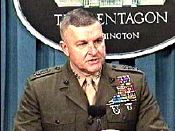 |
| Gen. Anthony Zinni |
The most prominent advocate of the containment policy is General Anthony Zinni, commander-in-chief of the U.S. Central Command. Gen. Zinni, who spent several months with Iraqi opposition groups in northern Iraq after the 1991 Gulf War, calls into question their viability as a potential threat to Saddam's regime.
Testifying before the House Armed Services Committee on March 11, Gen. Zinni explained his reservations about the Iraq Liberation Act. "I do not feel it's wise at this point to speak of providing weapons and camps for groups that are not viable," said Zinni. "History teaches you can change a regime, but come up with one like in Iran or Afghanistan and Somalia."
The INC Plan
The second option, put forward by the Iraqi National Congress (INC) and advocated by many republican members of Congress, involves three stages:
The problem, of course, is that this scenario bears too close a resemblance to the Bay of Pigs disaster. Critics also argue that Iraqi Republican guards could strike at the opposition enclaves before stage two is completed, forcing U.S. ground forces to intervene.
The "Silver Bullet"
A third option, premised on the assumption that the Iraqi opposition will probably not be able to defeat Saddam's forces militarily, is designed to bring about a coup within Saddam's inner circle. If life for those around Saddam can be made a miserable as possible, the reasoning goes, they will turn on him. Supporters of this plan advocate an extensive campaign of air strikes against Republican guard units designed to pressure them into confronting Saddam.
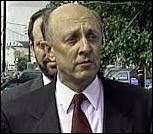 |
| James Woolsey |
Former CIA director James Woolsey offered a series of recommendations during his March 10 testimony before the House Armed Services Committee that incorporate elements of both the INC and Silver Bullet strategies: